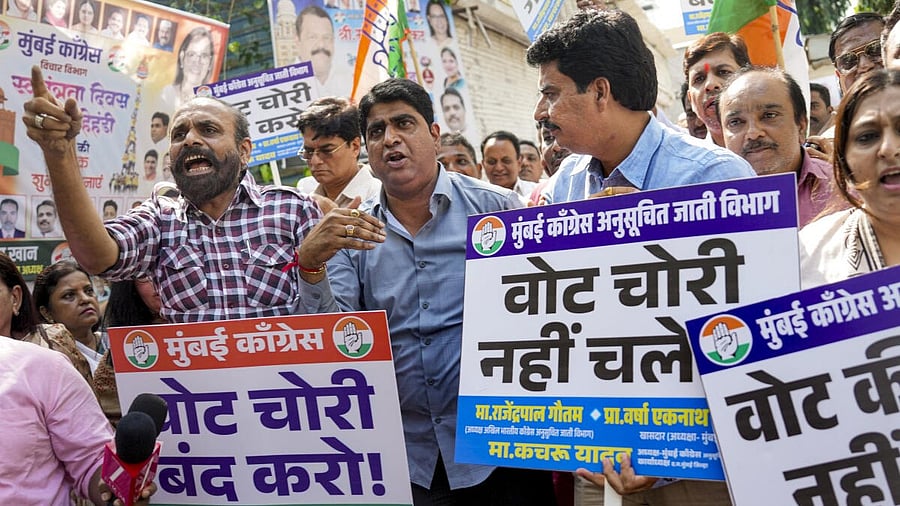
Congress party workers stage a protest over alleged 'vote chori' and Special Intensive Revision (SIR) of electoral rolls, in Mumbai.
Credit: PTI Photo
In the dusty border towns of north Bihar’s Mithilanchal region, where roti-beti ties with Nepal run deep and agriculture sustains most households, the ongoing Special Intensive Revision (SIR) has stirred a mix of anxiety and approval.
At border checkpoints like Jainagar in Madhubani district, Sashastra Seema Bal personnel stop motorcycles, four-wheelers and even tongas, checking documents and logging vehicle numbers. The once-open India–Nepal border is now under constant surveillance.
For many, the document drive feels like a race against time. “This is basically a search for documents. There is a problem, but since we have been given time, people are searching and submitting them.
"They are asking for birth certificates. Permanent residents have them, but those who have come from outside are facing difficulties. Those who have come from Nepal are indeed having problems,” said Sewalal Yadav, a farm labourer, seated on the Kamla river embankment, a deck of cards in hand.
Officials admit the bottleneck lies in proving eligibility under the Election Commission’s 2003 baseline voter list. “We don’t have any solution, we are just following orders,” said Barun Kumar, a Block Level Officer, who arrived at the embankment while DH was speaking with Yadav.
“Some, unable to produce certificates, are submitting letters from the village head signed by at least five residents as witnesses to their citizenship,” he added.
Shanti Devi, a tailoring trainee at Narar Kothi Chowk, recounted her own workaround: “My parental home is in Nepal. I used my husband’s Aadhaar card to make my residence certificate. My work is done, but the elderly, 55 to 60 years old, have nothing. The government should have made some arrangements for them.”
Not everyone sees the drive as a burden. Some insist it’s necessary. “What the government has done is very good — it will reveal who comes from where. Only those involved in wrongdoing will have a problem. We can prove we came from our parental home, not from Bangladesh or Pakistan. Even if our parents were uneducated, we still visited them for Raksha Bandhan and brought back documents,” said one.
The SIR’s validity is being debated in the Supreme Court. Supporters, however, see it as essential for “updating and correcting” the rolls and for identifying migrants who have entered from Bangladesh or Pakistan and allegedly altered the demography.
But in this remote borderland, where family, trade and culture have flowed freely across an invisible line for generations, the exercise is testing both paperwork and patience. Many said that though they support the move, they are now scrambling to get certificates to prove that they are Indians despite having voted in so many previous elections.